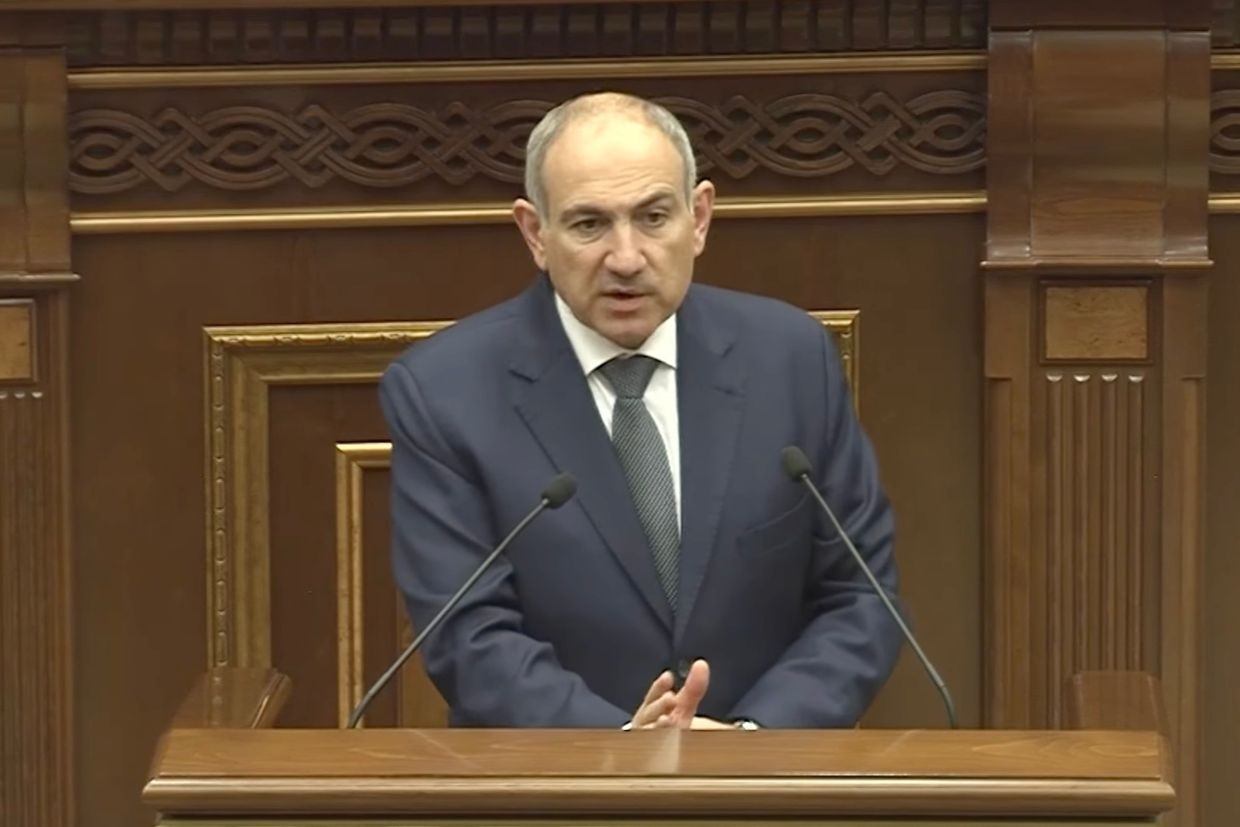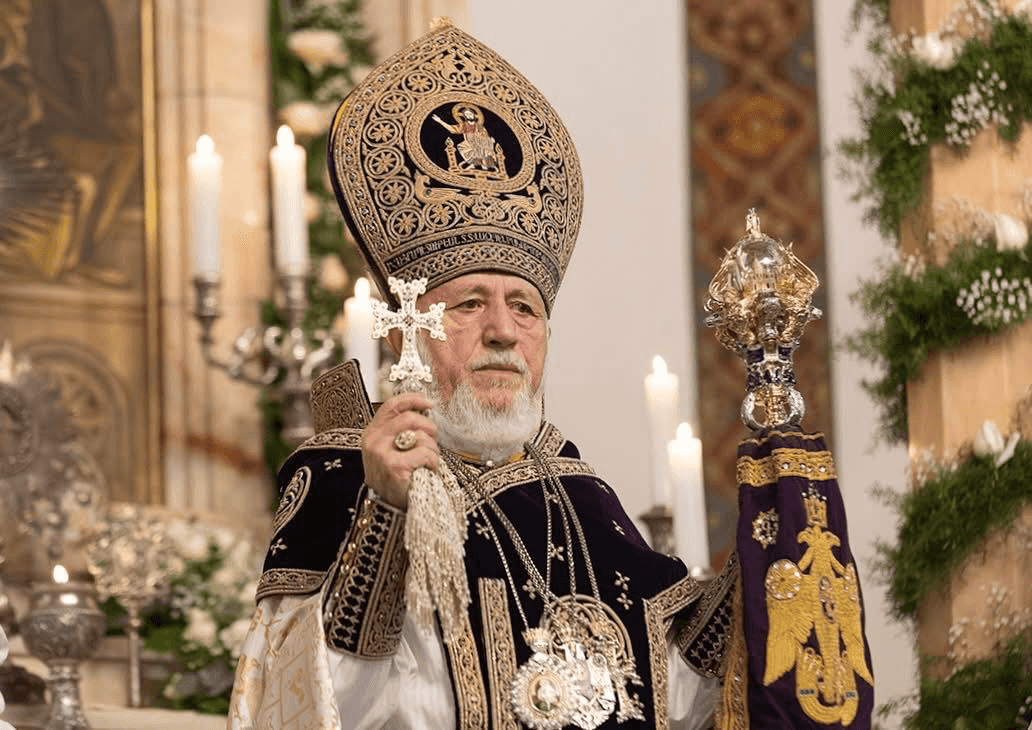
Armenian Prime Minister Nikol Pashinyan has insisted that despite ongoing war propaganda, ‘there will be no war, there will be peace’.
Speaking before parliament on Tuesday, Pashinyan said the government would not ‘deviate from the agenda of peace’.
‘It’s obvious that some forces both within and beyond Armenia are carrying out daily war propaganda and resorting to concrete actions aimed at implementing it’, Armenpress reported him as saying.
He added that Azerbaijan’s ‘war narrative’ stood out, as manifested by the ‘false accusations of ceasefire violations addressed to Armenia, as well as frequent, if not daily ceasefire violations committed by the Azerbaijani military’.
Echoing statements from the Armenian Defence Ministry, Pashinyan said that shooting from across the border did not appear to be directed at specific targets, aside from the two specific cases in the village of Khnatsakh in Syunik Province, where a residential building and a cultural centre were damaged.
Pashinyan reiterated Armenia’s call for Azerbaijan to investigate these cases and to take measures to put an end to them. Azerbaijan previously dismissed both accusations as ‘disinformation’.
Three days after Azerbaijan’s latest round of accusations began on 16 March, Pashinyan stated that he had provided explicit orders to Armenia’s Defence Ministry to avoid any escalation on the border, adding that ‘Armenia is heading for peace, not war’.

He reiterated this order on Tuesday, also repeating his invitation to Azerbaijan to create a joint mechanism to investigate border incidents, including ceasefire violations.
Despite the heightened tension and the shooting at the border, Pashinyan insisted that ‘there are no grounds for war’, as Armenia and Azerbaijan had recognised each other’s territorial integrity, and the inadmissibility of the use of force or the threat of force.
‘The peoples of Armenia and Azerbaijan deserve peace and peaceful co-existence. There will be no war, there will be peace’, Pashinyan said.
On the same day, Hulusi Akar, Chair of the Turkish Parliament’s National Defence Committee, accused Armenia of violating the ceasefire on the border with Azerbaijan during a visit to Baku. Azerbaijani state press agency APA quoted him as saying that those violations were ‘futile efforts’ and could not ‘lead to anything’.
In a press briefing, Akar also said Armenia ‘must accept the hand of peace extended by Azerbaijan as soon as possible’ and that the peace treaty ‘should be signed quickly’.
Azerbaijan’s peace preconditions
On Tuesday, Pashinyan said that Armenia was officially offering Azerbaijan to sign the peace treaty and simultaneously issue a joint application to the OSCE requesting the dissolution of the Minsk Group.
In the decades that followed the First Nagorno-Karabakh War in the 1990s, the OSCE Minsk Group — co-chaired by France, Russia, and the US — was the main venue for talks between the two sides.
Pashinyan’s statement came days after Armenian Foreign Minister Ararat Mirzoyan voiced a similar offer during a panel discussion on the sidelines of the Antalya Diplomacy Forum.
Mirzoyan’s offer, in turn, was in response to his Azerbaijani counterpart Jeyhun Bayramov reiterating that Azerbaijan had two preconditions before the deal could be signed.
‘First and foremost, it involves the dissolution of the outdated and ineffective Minsk Group, as well as amendments to Armenia’s constitution and the elimination of territorial claims over Azerbaijani territory’, Bayramov said.

Addressing the second precondition at parliament on Tuesday, Pashinyan denied that Armenia’s Constitution contained territorial claims against Azerbaijan, which was also confirmed by Armenia’s Constitutional Court.
Pashinyan said that the Azerbaijani Constitution ‘in fact, contains wordings that can be perceived as claims against Armenia, however, Yerevan is not raising this issue, because the draft peace agreement would resolve the issue’.
Pashinyan quoted the agreed text, saying that ‘the parties do not have territorial demands against each other and are bound not to make such demands in the future’.
‘So if we assume that Azerbaijan’s position regarding our constitution is not a pretext but a sincere concern, the most effective measure to dispel that concern would be the signing of the agreement, and not [refraining] to sign it’.
The Armenian government has announced plans to hold a referendum to adopt a new constitution as early as 2026. However, the government has insisted the move was a domestic issue and has denied it was conditioned by the peace process.
In a press briefing on Wednesday, Pashinyan said he believed ‘there should not be a reference to the Declaration of Independence in the text of the new constitution’, but added that it would be up to the Armenian people to decide this.
Azerbaijan has objected to this reference to the declaration in the constitution’s preamble as it refers to a joint decision by the Armenian Soviet Socialist Republic and the Karabakh Council to ‘reunify the Armenian SSR and the Mountainous Region of Karabakh’.










